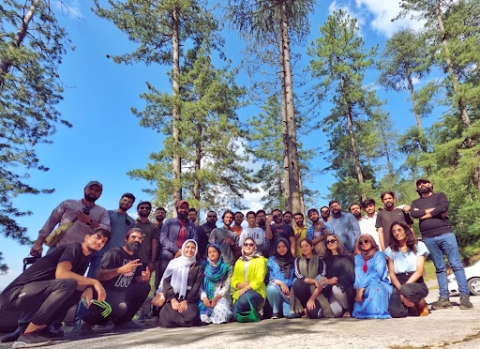In a society in which people are encouraged to take sides in their politics, unbiased perspectives can help individuals find middle ground and aid in depolarization. In Pakistan’s highly politicized media landscape, this type of news coverage is an anomaly.
Major broadcast networks in the country are owned by politicians, business elites or government institutions, and news coverage of domestic issues is often colored by these affiliations.
In 2016, I decided to start my own company to disrupt this reality. Built on the hypothesis that young Pakistanis crave nonpartisan, contextualized information, I launched The Centrum Media (TCM), Pakistan’s first digital news network.
For the past six years, TCM, which began as a team of two people, has developed into a newsroom, production company, and digital media consultancy firm with 40 full-time employees. Our office, run from the unconventional setting of a house in Islamabad, has the feel of an unpretentious startup-local newsroom hybrid, with young team members collaborating over the tops of computer screens.
Our reporting is recognizable through its snappy video editing and explanatory style. We’ve rolled out original series about prominent Pakistani figures, like former judges involved in some of the country’s landmark rulings, and we don’t shy away from sensitive social topics, giving a platform to everyone from transgender activists to death row survivors. In total, TCM has 2.6 million followers across YouTube, Facebook, Instagram and TikTok. The TCM Originals YouTube channel has more than 270,000 subscribers, and our most-watched videos have over 500,00 views.
Growing up in Pakistan in the aftermath of September 11, I became consumed with news and geopolitics from an early age. An avid reader, I closely followed the wars in Afghanistan and Iraq at a time when most of my classmates were more interested in trading Pokémon cards. When I moved to the U.K. to study journalism for my bachelor's degree, I was the first – sometimes to a fault – to start debates about international affairs, even with my teachers.
Disenchanted by the old-school style of my journalism classes, I studied the work of emerging news outlets like AJ+, Vice News and NowThis covering the digital information explosion around the Arab Spring. At the same time, I began to engage with student groups and journalism organizations in London. I began to realize that we need to explore the middle ground of issues more, instead of the extreme perspectives.
Pakistan ranks 157 out of 180 in the 2022 Reporters Without Borders Press Freedom Index. The country’s news organizations frequently use selective censorship, leaving out information news consumers need to understand stories in their entirety. Pakistan’s media regulators are known to block programs airing interviews with opposition leaders or controversial figures.
Despite my pessimism about journalism’s prospects in Pakistan, I felt the pull of my home country following graduation in 2015. After producing a few freelance pieces for international media, I started to see a gap in digital coverage that legacy media outlets weren’t filling. If I launched my own news platform, I thought, I could make the digital content I wanted to see from Pakistan. Soon after, TCM was born.

My colleague Wahid Ali and I began producing video content to publish on Facebook, and the stories quickly gained traction online. I was looking at our readers’ behavior and reading their comments. I looked at what other Pakistani outlets were doing, and identified what was working for them and what wasn’t. The numbers told us that young people were watching, and we grew TCM to focus on stories that would appeal to the younger demographic.
With a shoestring budget of savings I brought from the U.K., along with a small investment from family, I slowly expanded my team. But making the business profitable took some strategy. I started to get short-term contracts from commercial clients and organizations in the development sector, which helped me launch a second branch of the company, Centrum Communications, in 2018.
Since its inception, TCM has developed a reputation for its video content and interviews with some of Pakistan’s biggest names. Although my newsroom found its niche through social media, my personal accounts remain modest: deliberately, I stayed behind the scenes. I made my first on-screen appearance for TCM in May during an exclusive podcast interview with Pakistan’s former Prime Minister, Imran Khan.
Today, I’m focused on the brand’s sustainability. As part of ICFJ’s Elevate Program, I’m learning from mentors I didn’t have when I started. It’s all bootstrap; I was not a businessman, but I think, somehow, deep down there was this person hidden in me that started coming out. I started putting business plans on paper that previously existed only in my head.
I’m also working to share the knowledge I’ve acquired since launching TCM. One of my ventures, TCM Academy, aims to teach these skills to the next generation of Pakistani journalists. This requires me to keep learning myself. It’s changing so rapidly that if I’m not on top of the trends, I’m dead. There’s no other way. I also recently launched a podcast that I will host, a project separate from TCM’s other original content.
I’ve received offers from local organizations to buy TCM, but I’ve declined them; remaining independent, I believe, is key to staying true to TCM’s mission. In a divided society, I see this as an obligation. This is more than just a business to me; it’s my duty to bring credible reporting to people that will help them challenge preconceived notions and make informed decisions.
Elevate is ICFJ´s business hub, focused on helping C-level journalists who are running small and medium-sized media outlets develop their business skills so that their newsrooms can become sustainable and grow.